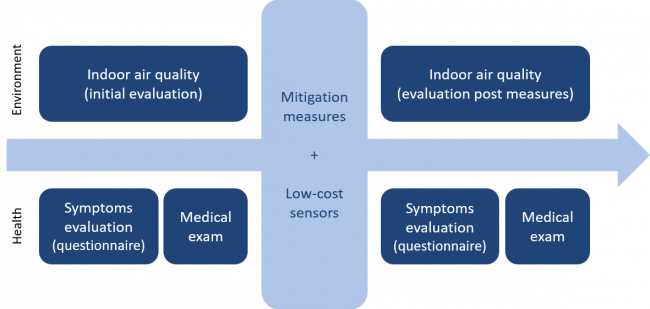CONTEXT
Most of the people is aware of the impacts that ambient (outdoor) air pollution have on health, but there are scientific evidences that indoor air pollution may cause equal or even more adverse effects on human health than ambient air pollution, as such:
- Eyes and throat irritation
- Stuffy nose and nasal outflow
- Headaches and dizziness
- Unjustified fatigue, lack of concentration
- Low productivity
Depending on the pollutants, their concentrations, exposure duration and exposed people’s vulnerability, air pollution may cause more or less severe health problems, as such:
- Frequent infections, like flu and colds
- Asthma attacks
- Allergies (particularly in people with atopy)
WHY NURSERY AND PRIMARY SCHOOLS?
Children are a risk group of the population, as they are more susceptible and more vulnerable to air pollution, their immune system is still developing and they breathe more volume of air per body mass than adults. Moreover, they spend about 90% of day indoors, being nursery and primary schools their first places for social activities. Additionally, World Health Organization (WHO) and European Commission declared priority studying the health effects of indoor air pollution on children’s health.
OBJECTIVES
The project “SENSINAIR– Low-cost sensors as a tool to reduce Air Pollution on Nursery and Primary Schools: Impact on Childhood Asthma” has the main goal of contributing for the mitigation of indoor air pollution in nursery and primary schools and their impacts on children’s respiratory health, by using low-cost sensors as tools empowering schools to act and to evaluate efectively the application of mitigation measures and the impact of reducing indoor air pollution on childhood asthma.
PREVIOUS STUDIES
The project “INAIRCHILD – Indoor Air Pollution on Nurseries and Primary Schools: Impact on Childhood Asthma”, involved 25 nursery and primary schools fro both Porto (urban) and Bragança (rural) districts. It included the detailed characterization of indoor air quality in 50 classrooms, 2 bedrooms and 11 canteens, being evaluated the respiratory health of 1706 children and allergen sensibilization of 341 children.
METHODOLOGY
SENSINAIR will be held simultaneously in two different urban areas from two different countries: (1) Porto, Portugal; and (2) São Paulo, Brazil.
Parameters to evaluate: temperature, relative humidity, carbon dioxide (CO2), particulate matter (PM2.5 e PM10), formaldehyde, volatile organic compounds and radon.

SENSINAIR project was approved by the Ethics Commission for Health of Centro Hospitalar Universitário de São João (CHUSJ), Porto. All data are anonymized and protected to guarantee confidentiality.
In Portugal, the SENSINAIR Project (PTDC/EAM-AMB/32391/2017 - POCI-01-0145-FEDER-032391) is funded by FEDER funds through COMPETE2020 - Programa Operacional Competitividade e Internacionalização (POCI) and by national funds (PIDDAC) through FCT/MCTES.

In Brazil, SENSINAIR project (2018/09011-9) was funded by:

